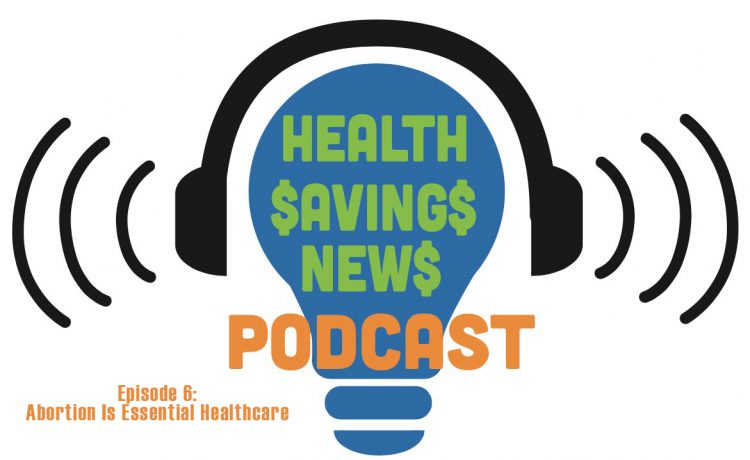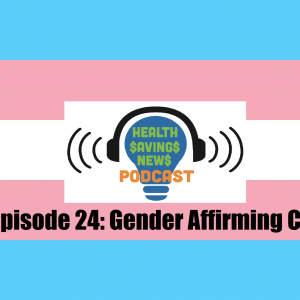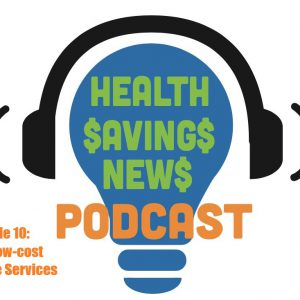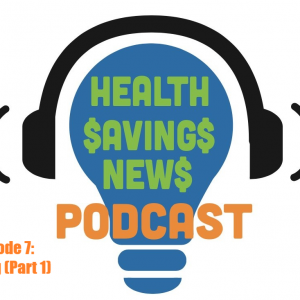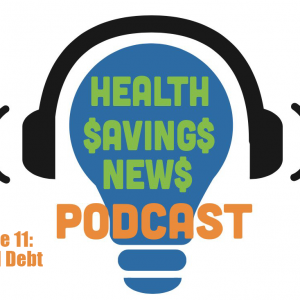Last Updated on November 22, 2022
This a transcript to episode 6 of Health Savings News. In the interest of making the podcast more accessible, we will post transcripts every two weeks as episodes release.
Evan (00:08):
Hello, and welcome to Health Savings News: the podcast about healthcare costs in America and how to save money on the often expensive care all kinds of people need. I’m your host, Evan O’Connor, joined by retired doctors, Rich Sagall and Mike Woods. Each episode we discuss healthcare costs in America, offer tips for saving money, and relevant news that affects and reflects the expensive landscape of healthcare in America.
This week’s episode is abortion. We ideally would’ve liked to have a guest for this episode as we are three cisgender white men. We reached out to several organizations, providers, and activists, and they understandably declined due to the increased need for their vital work at this time. In this episode, we are going to focus on abortion as essential healthcare and the cost associated with reduced access and criminalization.
This topic does have a lot of other focal points. Here’s some personal podcast recommendations for those who might wanna explore this from other angles. If you’d like to hear a political take on the Supreme court’s decision, I’d suggest the podcast 5-4 from Prologue Projects. If you’d like to know about the legal ramifications, listen to the legal podcast Opening Arguments. If you’re interested in the history of abortion rights in the United States, a selection of episodes of It Could Happen Here from Cool Zone Media covered it this past May. And if you want to learn about cultivating hope and building a more just world, listen to Movement Memos from nonprofit independent news organization Truthout. All of these will be listed in the show notes, and we’ll give more suggestions at the end of this show.
Rich (01:33):
Abortion is considered an essential healthcare. Multiple studies indicate that the inability to receive abortion care places pregnant individuals further into poverty and harms their health as well as the wellbeing of their current and future children. Many people are losing access to nearby care essential in deciding whether to continue a pregnancy or not — particularly communities of color, LGBTQ+ people, residents of rural areas, and people living in poverty. People in states are criminalized abortion will need to travel sometimes hundreds of miles to access healthcare. The ability to access abortion in a timely manner is critical to the health and safety of individuals seeking care. Delays in access increases the risk that that a person may experience in medical complication and negatively impact their social, emotional and psychological wellbeing. Abortions late in pregnancy costs more than procedures performed early in pregnancy. The average cost of a surgical abortion is approximately $495 in the first trimester compared to over $2,000 at 20 weeks of pregnancy. Medication abortions rarely cost more than a couple hundred dollars. The cost of routine pregnancy, delivery, and healthy newborn is an average of $30,000 to $50,000 — and that’s without complications.
Mike (02:53):
One of my significant concerns about this whole issue is that there are times when according to state laws something being performed is defined as an abortion when it really isn’t. This is really life saving treatment for several conditions including ectopic pregnancy, septic uterus, and certain miscarriages that are fatal to the mother if not treated with an abortion. You have to remember in every one of these cases, the fetus is not viable. In other words, the fetus is either already dead or has no chance of survival. Doctors in these restrictive states are being told under some of these situations that that are life threatening is to wait until the mother is almost to the point where their vital signs are dropping and enough that it will then be considered in a “medical emergency” and they’ll be able to avoid criminal charges for the procedure. There’s even an Ohio law that mandates that an attempt to reimplant the fetus back into the uterus must be made when there is an ectopic pregnancy. Well, this is one problem when politicians get involved in medical care. An ectopic pregnancy is when the fetus is developing outside the uterus — most of the time in the fallopian tube, although could be in the ovary, the abdominal wall, or even the cervix. The problem is that there is no current experience or technology to do this procedure that the politicians have included in the law. Where they come up with this idea, I have no idea, but it is just not medically possible. These restrictions can even affect people that have conditions totally unrelated to pregnancy. Some people with certain conditions are treated with a medication called methotrexate which is used for chemotherapy and for treating people with autoimmune diseases. Since this drug has a likelihood of causing an abortion some states are restricting the sale of this, even to women who are not pregnant or even able to get pregnant. There’s another issue that is starting to surface is that in some states, the definition of life beginning at fertilization that some states have, have really complicated the use of infe fertilization. So the question now becomes would the law be broken if a frozen embryo, which is considered life already in these states is discarded or the number of implanted embryos is reduced so that there are not too many children from a single pregnancy, or is it even against the law, or would you even be considered as having an abortion if you were implanted with an embryo, but it is not successful?
Rich (05:58):
Limiting abortion forces people to make tough decisions. One of the consequences about outlawing abortion is forcing people to have a forced birth in a developed country with the highest maternal mortality rate, no guaranteed paid maternity leave, no universal or subsidized childcare, no continued birth and parent care, and frequently inaccesible mental healthcare. This results in any number of potential consequences. For example, pregnant people in their children will die as a result of lack of care. The lack of support in many states will cause families to fall into poverty. This creates more hungry children, more illness, and the need for additional medical care, along with higher rates of mental illness. This eventually results in higher overall costs for medical care, usually paid by public funded Medicaid. Many opportunities for advancement will be lost because of these added children.
Evan (06:56):
The choice to carry our pregnancy to term and become a parent is a deeply private and personal one. Taking away a person’s right to make a decision for themselves puts freedom further out of reach from millions of Americans and relegates pregnant people to second class citizens who can have their bodily autonomy taken from them. Women, non-binary people, and trans men are not equal in society. If they cannot make the choice to not be pregnant. Personal or religious objections to a safe standard medical procedure should not be allowed to dictate the terms of another person’s healthcare. Abortion should be accessible and on demand without apology for all who need them. At the time of recording abortion is illegal in nine states with limited exceptions. Over a dozen more are expected to Institute full or partial bans to the procedure in the coming weeks. Attorney General Merrick Garland has said that states cannot ban Mifepristone and Misoprostol — FDA-approved medication abortion pills — based on disagreement with the federal government on their safety and efficacy. Medication abortion is still available in all 50 states. In states that unjustly restrict access to abortion care alternative route to safe medication abortion pills are still available. Abortion is currently protected as a right through the law and state constitutions in Washington DC and 16 states.
Mike (08:09):
Yeah, for now women who are living in restrictive states are free to travel to another state. The ability to travel interstate is guaranteed by the Constitution. However, certain states are trying to restrict this by passing laws that make it illegal to aid or abet abortions by helping to transport these women to another state. Like we’ve seen with the reporting healthcare providers who perform abortions in these states, the law hands the enforcement of these rules into to residents, or sort of a posse mentality who could then file lawsuits against any of those that they see that have violated the law, or they think has violated the law. When having an abortion in another state the doctor or patient relationship usually will protect the confidentiality of the medical procedure when it’s done in another state. However, there are many other means of discovering that a woman has traveled to another state. Because of this some states are working on ways to protect these women from prosecution in their home state, which is allowed in most cases. Things that the these states can do can be refusing to provide corroborating evidence when requested by law enforcement from other states, not cooperating with other investigations from other states, or banning the extradition of people who get or perform abortions to states that criminalize the procedure.
Evan (09:47):
Google has said that they will be deleting location history of women having abortions out of state to protect their records. There are also proactive steps you can take to keep your digital footprint and phone data secure. Keep data separate by using a separate browser with hardened privacy settings, such as DuckDuckGo and review the privacy settings on your cell phone plan to see what information is being collected about you, who is collecting it and what they might do with it. If you’re using a period tracker app, carefully examine its privacy settings. If you can, consider switching to a more privacy focused app. Euki, for example, does not store your data in the cloud or anywhere else. Only the user has access to their data, which can be deleted. The app also contains information about abortion and reproductive health and is password protected. You can even create a fake password that will queue up a fake app. HIPAA laws do not protect your medical information when requested in the course of a criminal investigation.
Rich (10:41):
Let me add a couple of other precautions. One is don’t do any texting about what your plans are, what you’re looking into, because texts can be forever. The same with emails. You want to keep those private and probably not discuss what you’re planning to do. Some people have gone so far as to say, you shouldn’t even take your cell phone. If you’re going out of state to have one of these procedures done, because they can track your whereabouts.
Mike (11:05):
Yeah. Keep it off all other social media as well for the same reasons.
Evan (11:11):
Remember the decision of criminalizing abortions is left to individual states and the enforcement is up to local attorney generals. Since the door has been left open to create a federal law banning abortion, even states that have codified their right to abortions could face a nationwide prohibition on essential healthcare if anti-abortion authorities gain control of additional branches of government. We encourage all Americans to register to vote and participate in local and national elections. 469 members of Congress, 36 governors, and over 6,000 state legislators are up for election November 8th, 2022. Deadlines vary by state, so be sure you’re registered in time to vote.
Mike (11:47):
One thing to remember is that despite the Supreme Court ruling, 60% of Americans are still in favor of abortions. So obviously our representatives aren’t truly representing what the people of this country want. So it’s another reason to make sure you get out there and vote so that you can get your voice heard and get the politicians to do what you want to do and know what they want to do.
Evan (12:15):
To further engage with the legislature, contact your elected representative to make your voice heard. Call 202-224-3121 to reach the U.S. Capitol switchboard. From there, you can be connected to your elected congressional representative or senator’s office. You can find information for your local or state elected officials by searching online. Protests are also being organized nationwide. Demand Congress pass the Women’s Health Protection Act and protect other unenumerated rights of privacy.
Supporting abortion access and reclaiming our civil rights cannot be done alone can only be achieved through organizing and collective action. Get involved with a mutual aid group, donate to local abortion funds, practical support organizations, and independent clinics. If you can’t donate, volunteer. These organizations are likely overwhelmed right now. Follow up, be polite, and remember, they’ve been doing this important work for years. If you can’t volunteer, share good and accurate information to abortion seekers can access care.
[segment break]
Evan (13:18):
One of the rotating segments we’ll feature on Health Savings News is debunking health myths. Health myths and misinformation often spread wider and faster than the true, accurate information, and can be harmful to public health. Some myths have circulated for decades.
Mike (13:29):
As a pediatrician this is one that was very near and dear to my heart, and that’s the association of that vaccine with autism. All pediatricians have run across families who refuse to get their children vaccinated, and a vast majority of them use this as an excuse for not having that happen. The bottom line is that vaccines do not cause autism. The rumor started when a study was done that linked autism to the measles, mumps, and rubella vaccine. This caught on like wildfire and the MMR vaccine rates decreased significantly for decades. The author of the study eventually owned up to the fact that he made up all the data and that the association didn’t really exist. Since that time, numerous studies have been done trying to associate the MMR to autism and what it turns out to be, or the truth of the matter is that autism is most likely to happen at approximately the same age as the MMR is given. So if you look at a population of children, those who have not received the MMR and those who have received the MMR, the rate of autism is exactly the same. The bottom line is this is definitely a health myth that you absolutely cannot believe.
[segment break]
Evan (15:14):
The last segment of each episode, we suggest some of the culture, art, entertainment, and social causes we’ve been engaged with to each other and our listeners. Obviously, the social cause we are engaged with is pretty clear. I would like to suggest the book New Handbook for a Post-Roe America: The Complete Guide to Abortion Legality, Access, and Practical Support by Robin Marty. It is a comprehensive and user friendly guide to understanding and preparing for the ongoing changes to reproductive rights and getting the healthcare you need. The most recent addition came out in 2021, but it is still full of really valuable information that is only going to become more valuable as time goes on.
I also mentioned earlier in the podcast, the podcast Movement Memos brought to you by the nonprofit independent news organization Truthout. Hosted by Kelly Hayes, they connect with activists, journalists, and experts who break down various struggles and what listeners can do to help. They have several episodes on the less considered effects criminalizing abortion access is likely to have for pregnant people, children, and families — especially marginalized people. They also have a great series on cultivating hope, which can be really hard in times of despair but still incredibly valuable for communities and individual mental health.
Thank you so much for joining us for this episode of Health Savings News. Please subscribe, rate, and review us on Apple Podcast or wherever you’re listening to the show, it really does help. You can follow @NeedyMeds on Twitter, Facebook, Instagram, LinkedIn, YouTube, and you can follow @HealthSavingPod (no S at the end of saving) on Twitter for updates specific to this podcast and send questions, comments, and topic suggestions to podcast@needymeds.org. Our music is composed by Samuel Rulon-Miller. His music can be found at musicisadirtyword.bandcamp.com. Health Savings News podcast is produced by me, Evan O’Connor. All the sources we used in our research can be found in the episode’s podcast description on our website or your podcast app of choice. Health Savings News is not intended to substitute for professional medical, financial, or legal advice. Always seek the advice of qualified healthcare, professional, or appropriate professional with any questions. Views expressed on Health Savings News are solely those as the individuals expressing them. Any views expressed do not necessarily represent views in health savings, news, other contributors to organization or staff. Thanks again for listening. See you in two weeks with our next episode.
Sources:
https://blog.needymeds.org/2022/06/30/criminalized-abortion-is-still-healthcare/
https://healthlaw.org/abortion-is-health-care/
https://clearhealthcosts.com/blog/2014/06/abortion-cost/
https://www.ajpmonline.org/article/S0749-3797(21)00567-5/fulltext
https://healthcareinsider.com/total-pregnancy-costs-49390
https://www.axios.com/2022/06/28/abortion-ban-exceptions-women-medical-emergencies
https://inthesetimes.com/article/abortion-rights-union-labor-roe-wade-supreme-court
https://www.teenvogue.com/story/where-abortion-is-illegal-now-abortion-law-by-state
https://www.axios.com/2022/06/24/merrick-garland-fda-abortion-pills-state-bans
https://19thnews.org/2022/05/blue-states-laws-codify-abortion-access-protections/
https://truthout.org/articles/now-is-the-time-to-aid-and-abet-abortion/
https://www.eff.org/deeplinks/2022/06/security-and-privacy-tips-people-seeking-abortion
https://ballotpedia.org/United_States_Congress_elections,_2022
https://ballotpedia.org/Gubernatorial_elections,_2022
https://ballotpedia.org/State_legislative_elections,_2022
https://www.vote.org/voter-registration-deadlines/
https://www.ashasexualhealth.org/make-your-voice-heard/
https://map.wewontgoback.com/?source=ppfa
https://news.bloomberglaw.com/us-law-week/supreme-court-justices-disagree-on-scope-of-dobbs-ruling
https://map.wewontgoback.com/?source=ppfa
https://donations4abortion.com/funds-by-state
https://www.abortionfinder.org/

